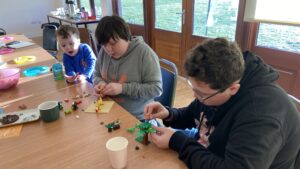As a midwife, I play a very active role in the immediate postpartum period with so many women. I see the unique and different ways the postpartum period unfolds for each family unit.  I have seen some women whose jobs and whose partners jobs allow for adequate time off to help with healing and adjustment, and then I have seen women who pray for a baby on a Thursday or Friday so that their partner can be around to help before going back to work on Monday, with no reliable sources of help. Our culture does a poor job of supporting women through the postpartum period. Many times a woman births her baby, and then is naturally expected to jump back into her normal life within days, with little acceptance of the major changes that are going on for the woman as she heals from delivery, adjusts to breastfeeding and sleep deprivation, and gets used to what is becoming her new normal.
I have seen some women whose jobs and whose partners jobs allow for adequate time off to help with healing and adjustment, and then I have seen women who pray for a baby on a Thursday or Friday so that their partner can be around to help before going back to work on Monday, with no reliable sources of help. Our culture does a poor job of supporting women through the postpartum period. Many times a woman births her baby, and then is naturally expected to jump back into her normal life within days, with little acceptance of the major changes that are going on for the woman as she heals from delivery, adjusts to breastfeeding and sleep deprivation, and gets used to what is becoming her new normal.  Most women are lucky to get to run to the toilet (often accompanied with children) a few times a day, let alone have time to eat a meal or take a shower.
Most women are lucky to get to run to the toilet (often accompanied with children) a few times a day, let alone have time to eat a meal or take a shower.
I regularly run through this list of self care items with my own clients as they are in their adjustment period, knowing that this list is key as they work through the first weeks/months postpartum. If you, or someone you know, is entering into the postpartum period, here is a list of self care items that can help make the postpartum period a much easier, happier time.
 1. Rest! This may seem so obvious, yet so difficult for mamas in the postpartum period to do. I highly encourage sleeping when the baby sleeps, as much as your day to day life allows. It is generally seen that getting five hours of sleep in a 24 hour period is the minimum amount of sleep needed to help with mental and emotional sanity.
1. Rest! This may seem so obvious, yet so difficult for mamas in the postpartum period to do. I highly encourage sleeping when the baby sleeps, as much as your day to day life allows. It is generally seen that getting five hours of sleep in a 24 hour period is the minimum amount of sleep needed to help with mental and emotional sanity.  Granted, this varies slightly from person to person, but we know sleep is powerful. Mamas, make sure you are getting adequate rest!
Granted, this varies slightly from person to person, but we know sleep is powerful. Mamas, make sure you are getting adequate rest!
2. Eating and Drinking! A breastfeeding mama burns approximately 500 calories in a 24 hour period, and a standard woman’s body demands food and drink accordingly. It is important to eat high fat, high protein meals and snacks as the body demands to keep up with your milk production, as well as drink water frequently through out the day.  I often recommend to my clients to keep a basket near their main nursing areas that are filled with snacks such as nuts, protein bars, fruit, and bottled water so that they have something readily available to them when hunger or thirst strikes, but they are occupied with a nursing baby.
I often recommend to my clients to keep a basket near their main nursing areas that are filled with snacks such as nuts, protein bars, fruit, and bottled water so that they have something readily available to them when hunger or thirst strikes, but they are occupied with a nursing baby.
 I also recommend considering easy to make dinners that can be put together without too much fuss (such as crock pot meals) in the evening while still taking care of your kiddos. Another good option for eating during the day is to pre make containers of food that can be thrown into the microwave and give you a warm meal in a minute. Find a system (and seek help!!) that helps you make sure you stay fed and hydrated.
I also recommend considering easy to make dinners that can be put together without too much fuss (such as crock pot meals) in the evening while still taking care of your kiddos. Another good option for eating during the day is to pre make containers of food that can be thrown into the microwave and give you a warm meal in a minute. Find a system (and seek help!!) that helps you make sure you stay fed and hydrated.
 3. Supplements! Part of self care is putting things in your body that support healing and well being. If you are struggling mentally, emotionally, and physically in the postpartum, then consider supplements that may help. Be diligent with things that you know help you feel better.
3. Supplements! Part of self care is putting things in your body that support healing and well being. If you are struggling mentally, emotionally, and physically in the postpartum, then consider supplements that may help. Be diligent with things that you know help you feel better.  I recommend staying on a good prenatal through out the nursing days, as well as considering fish oil, b complex, and d3 to name a few supplements that can be powerful in the postpartum. Definitely reach out to your healthcare provider and ask their opinion of supplements to help you if you are unsure.
I recommend staying on a good prenatal through out the nursing days, as well as considering fish oil, b complex, and d3 to name a few supplements that can be powerful in the postpartum. Definitely reach out to your healthcare provider and ask their opinion of supplements to help you if you are unsure.
 4. Placenta Encapsulation! Placenta encapsulation has been known to improve the hormone adjustment in the postpartum period by helping with postpartum depression, energy, milk supply, etc. Among my clients, most report feeling an increased amount of energy and a better emotional adjustment when consuming their placenta, either by encapsulation or in a smoothie.
4. Placenta Encapsulation! Placenta encapsulation has been known to improve the hormone adjustment in the postpartum period by helping with postpartum depression, energy, milk supply, etc. Among my clients, most report feeling an increased amount of energy and a better emotional adjustment when consuming their placenta, either by encapsulation or in a smoothie.  If you have decided that placenta encapsulation is a good fit for you, be diligent with taking your capsules on a daily basis to continue to notice the benefits. If you notice worsening symptoms, stop taking your pills and contact your placenta encapsulator and/or healthcare provider.
If you have decided that placenta encapsulation is a good fit for you, be diligent with taking your capsules on a daily basis to continue to notice the benefits. If you notice worsening symptoms, stop taking your pills and contact your placenta encapsulator and/or healthcare provider.
 5. Walking! I put my clients to getting outside and taking a walk after their home visit on day two. Getting the body into motion, even if you only feel up to walking two minutes, has a lot of benefit in a woman’s sense of well being. Make a point to wear your baby and get outside and walk, building up to 30 a minutes at least five times a week to help clear the mind and get some good endorphins flowing.
5. Walking! I put my clients to getting outside and taking a walk after their home visit on day two. Getting the body into motion, even if you only feel up to walking two minutes, has a lot of benefit in a woman’s sense of well being. Make a point to wear your baby and get outside and walk, building up to 30 a minutes at least five times a week to help clear the mind and get some good endorphins flowing.
6. Sunlight! I have walked into many homes for a postpartum check up to find a weepy mama in a dark, stuffy room, isolated and alone.  The first thing I do is open the blinds and let some sun light into the room. Sunlight is so good at changing the atmosphere and the overall demeanor. If you are feeling emotional and overwhelmed, open the blinds or sit out on your porch and take in the sunlight and fresh air.
The first thing I do is open the blinds and let some sun light into the room. Sunlight is so good at changing the atmosphere and the overall demeanor. If you are feeling emotional and overwhelmed, open the blinds or sit out on your porch and take in the sunlight and fresh air.
7. Quiet Time/Meditation! I find with my clients who are used to daily bible study time or meditation, that getting back in the routine of setting aside that daily time can be powerful in the postpartum healing, but one of the first things that gets put aside as you adjust to a newborns schedule and healing. Find ways to fit that time back into your daily life. Download a Bible app. Listen to a Bible study online. Keep a positive book in your nursing snack box to read while nursing. Spend time in prayer.
 On the same topic, if your church or bible study group is a source of encouragement, make a point to attend regularly. Don’t feel like you have to stay back because you have a baby. Do what feels right for you and your baby.
On the same topic, if your church or bible study group is a source of encouragement, make a point to attend regularly. Don’t feel like you have to stay back because you have a baby. Do what feels right for you and your baby.
8. Getting Out of the House! On that note, definitely get out of the house. If you are feeling overwhelmed in the postpartum period, load the kiddos up and go somewhere.  Maybe that is to a grandparent’s house or meeting a friend for lunch. Being stir crazy and feel locked in only hurts the overall emotional and mentally healing and processing the postpartum brings.
Maybe that is to a grandparent’s house or meeting a friend for lunch. Being stir crazy and feel locked in only hurts the overall emotional and mentally healing and processing the postpartum brings.
9. Doing Something Special Just for You! Pump a bottle and leave the baby with your partner for a couple hours and step away from responsibilities.  Get a massage or a pedicure. Maybe you want to attend a movie by yourself. Perhaps a walk through Target sounds like Heaven on Earth. If you are feeling overwhelmed, talk with your partner and plan to take a couple hours just for you the next day that is available.
Get a massage or a pedicure. Maybe you want to attend a movie by yourself. Perhaps a walk through Target sounds like Heaven on Earth. If you are feeling overwhelmed, talk with your partner and plan to take a couple hours just for you the next day that is available.
10. Find Your Tribe! It truly takes a village. Few, if any, were meant to go along the postpartum road alone. Seek support from fellow, like minded mamas who are right there in the trenches with you, or have been right where you are!  Find a mom’s group where you can coordinate play dates, which gives you adult interaction time. Perhaps it is too difficult to get out of the house frequently, so maybe an online support group of friends is more beneficial. Your tribe is out there. There are women just like you out there wanting support too. You aren’t alone!
Find a mom’s group where you can coordinate play dates, which gives you adult interaction time. Perhaps it is too difficult to get out of the house frequently, so maybe an online support group of friends is more beneficial. Your tribe is out there. There are women just like you out there wanting support too. You aren’t alone!
 11. Seek Help if Things Seem Abnormal! There is a line between an overwhelming day and something more. Postpartum mood disorders aren’t always talked about enough in our day to day life, and I think the continual pressure to get back to the standard “normal” only increases women having a harder time with postpartum mood disorders.
11. Seek Help if Things Seem Abnormal! There is a line between an overwhelming day and something more. Postpartum mood disorders aren’t always talked about enough in our day to day life, and I think the continual pressure to get back to the standard “normal” only increases women having a harder time with postpartum mood disorders.  Postpartum mood disorders are more than depression, which I think keeps women from seeking help. Aside from depression, women in the postpartum can experience anxiety and rage as well. Find an area postpartum support group to join and talk with other new mom’s about how you are feeling. Seek a therapist who is experienced with working with women and postpartum mood disorders.
Postpartum mood disorders are more than depression, which I think keeps women from seeking help. Aside from depression, women in the postpartum can experience anxiety and rage as well. Find an area postpartum support group to join and talk with other new mom’s about how you are feeling. Seek a therapist who is experienced with working with women and postpartum mood disorders.
 As one of my mamas told me, “It’s (postpartum) not always rainbows and butterflies. Postpartum is a roller coaster of emotions. I really had to focus on being gentle with myself and allowing my feelings to come through instead of fighting them or denying them. Like my loving midwife said during my baby’s birth, ‘Let your body be okay with this.'”
As one of my mamas told me, “It’s (postpartum) not always rainbows and butterflies. Postpartum is a roller coaster of emotions. I really had to focus on being gentle with myself and allowing my feelings to come through instead of fighting them or denying them. Like my loving midwife said during my baby’s birth, ‘Let your body be okay with this.'”
Sweet, dear mama… be gentle to yourself. You didn’t grow this baby overnight, and the adjustment of this sweet little one being in your arms and not in your womb will not happen overnight either. I am confident that you are an amazing mama doing the best you can in the current circumstances that you are in.  Take a breath, implement your self care regimen, and be so kind to yourself as you, your partner, your family all adjust to what is the new normal with the latest addition to your family.
Take a breath, implement your self care regimen, and be so kind to yourself as you, your partner, your family all adjust to what is the new normal with the latest addition to your family.
Many thanks to all these awesome couples who sent me these real life postpartum pics to use in this blog.
-Midwife Shannon
#sacredjourneymidwifery
Save
Save


